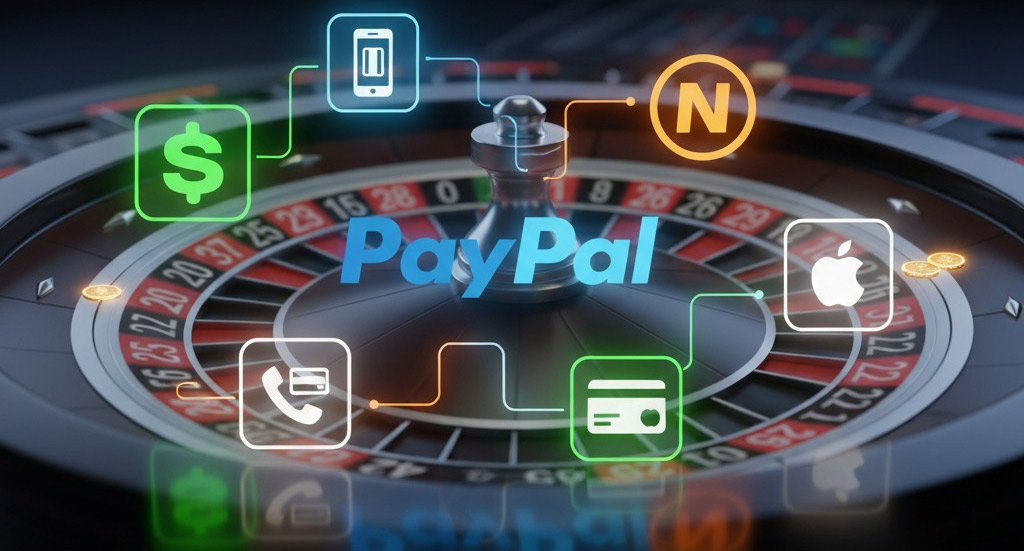Choosing how to move money in and out of a casino account isn’t just admin — it shapes your entire experience. If you’ve ever sat on a roulette hot streak only to wait days for a withdrawal to hit your bank, you know exactly how important the right wallet is.
Here’s the reality: PayPal is the most familiar name in the e-wallet game, but it’s not always the most practical. Skrill, Neteller, and even newer mobile-first options like Apple Pay or Pay-by-Phone sometimes beat it on reach, limits, or perks. The trick is knowing when PayPal is the best move, and when one of its rivals gives you more leverage.
PayPal: The Familiar Face
Why players like it:
- Speed where it counts: Deposits are instant, and withdrawals often land within 24 hours. Compared to bank transfers that drag on for 3–5 days, it feels lightning fast.
- Trust factor: If a casino offers PayPal, that’s usually a green flag. PayPal only partners with licensed operators in regulated markets, which cuts down risk.
- Ease of use: If you already use PayPal for shopping, there’s no extra setup. Your casino balance just becomes part of your normal financial flow.
Where it falls short:
- Limited coverage: Plenty of casinos — especially offshore ones — won’t touch PayPal. If you like niche roulette platforms or bonus-heavy sites, you’ll hit roadblocks.
- Hidden costs: Currency conversion fees and withdrawal fees can chip away at winnings. Not brutal for casual play, but noticeable if you’re moving four figures or more.
- Not built for high-rollers: Transaction limits can feel restrictive if you’re playing big.
Bottom line: PayPal works brilliantly if your casino supports it. But its selective approach means you can’t rely on it everywhere.
Skrill and Neteller: Built for Gamblers
These two are practically part of the online casino ecosystem. If PayPal is the safe, mainstream choice, Skrill and Neteller are the specialist tools.
Why they work:
- Acceptance almost everywhere: Offshore casinos, crypto-friendly platforms, high-bonus sites — Skrill and Neteller are usually there when PayPal isn’t.
- Bigger toolkit: Skrill supports over 40 currencies, both offer prepaid cards, and VIP tiers unlock higher limits and lower fees.
- Good for bigger bankrolls: The systems are built with high-volume players in mind.
The trade-offs:
- Fees stack up: Deposits, bank withdrawals, and currency conversions aren’t free. If you’re not careful, they eat into your edge.
- Weaker brand trust outside casinos: Skrill and Neteller are respected in gambling circles but don’t carry PayPal’s mainstream reputation.
If you’re a roulette player who likes hopping between platforms chasing the best promos or bonus chips, Skrill and Neteller give you freedom PayPal can’t match.
Apple Pay and Pay-by-Phone: Mobile Convenience
If PayPal is about security and Skrill/Neteller are about reach, mobile wallets are about frictionless convenience.
Apple Pay
Apple Pay makes depositing almost too easy. If you’re already in the iOS ecosystem, you double-tap, face-scan, and your casino account is loaded. It’s private, fast, and requires zero extra sign-ups.
The catch? Most casinos only allow Apple Pay for deposits, not withdrawals. That means you can get money in quickly but you’ll need another method — usually a bank transfer — to cash out. It’s smooth on the way in, clunky on the way out.
Pay-by-Phone
Even more stripped down than Apple Pay. You just charge deposits directly to your mobile bill. No card details, no wallet logins. Great for privacy and small, casual deposits.
The limitation is obvious: you can’t withdraw to your phone bill. So again, you’ll need a second method lined up for when you win.
Prepaid and Hybrid Options
Some players prefer prepaid cards or casino-linked wallets like Play+. These act as bridges: you load them up, use them in casinos, and often cash out to them faster than to a bank. For roulette players, it’s a handy way to ring-fence a bankroll — your prepaid card only has what you’re prepared to risk, nothing more.
The downside is they’re not as universally accepted as Skrill or PayPal, and you don’t get the same kind of buyer-protection ecosystem. They work well if you like control and speed, less so if you’re hopping between many platforms.
Why the Game You Play Matters
Not every casino game puts the same pressure on your payment method. A poker player might deposit once for a tournament and not touch their account for hours. A slots player might chase bonuses but never worry about withdrawal speed.
Roulette, though, is different. The game is built on short, sharp cycles — 20 seconds, a spin is done, and you’re either up or down. Bankroll swings are faster, deposits happen more often, and withdrawals can come mid-session if you’ve hit a hot run.
That’s why roulette is the perfect lens for comparing e-wallets. Your choice of payment method doesn’t just sit in the background — it actively shapes how you play and how much of your winnings you keep.
How Your Wallet Shapes Roulette Play

Roulette isn’t just about odds; it’s about rhythm. A wheel spins every 20–30 seconds, and players often adjust bets rapidly — pressing a streak, chasing a number, or locking in a win. That pace means your payment method directly affects how you manage your bankroll around the game.
- Instant deposits matter. If you’re playing with PayPal, you can reload mid-session without breaking stride. Skrill and Neteller offer the same immediacy, but not every mobile-first wallet does. Nothing kills a roulette flow like waiting for a card payment to clear while the wheel keeps spinning.
- Withdrawal speed changes your strategy. A common roulette tactic is walking away once you’ve doubled a bankroll. If you can pull those winnings out in under 24 hours with PayPal, the money feels real and safe. With slower methods, players are tempted to keep spinning, often giving back their edge.
- Limits influence bet sizing. Skrill and Neteller shine for players who like to push higher stakes. Their VIP tiers allow bigger withdrawals and deposits, while PayPal’s caps can feel restrictive if you’re regularly betting in the hundreds per spin.
- Bonuses make a difference. Many roulette players stretch bonuses by betting on red/black or odd/even. If your deposit method disqualifies you from that bonus — as often happens with Skrill or Neteller — you’re losing value before the first spin.
If you’re curious about how PayPal lines up specifically for roulette deposits and withdrawals, there’s a detailed breakdown on rouletteuk, which tracks the casinos where PayPal is fully integrated.
Fees and Bonus Eligibility: The Fine Print That Matters
Choosing an e-wallet isn’t just about deposits and withdrawals. Two overlooked factors can make or break your experience: transaction costs and bonus rules.
Fees: The Silent Bankroll Killer
- PayPal: Deposits into casinos are usually free, but pulling money out to your bank or converting currencies isn’t. Conversion fees hover around 3–4%, which is noticeable if you’re playing international casinos or betting in a different currency than your account.
- Skrill/Neteller: The fee structure is more aggressive. Deposits and withdrawals can each carry small percentages, and conversion fees stack if you’re moving money across currencies. For high-rollers, this adds up fast — though VIP tiers reduce costs.
- Apple Pay & Pay-by-Phone: Apple Pay itself doesn’t charge players, but casinos sometimes tack on their own fees. Pay-by-Phone almost always has limits on how much you can deposit, which indirectly raises your cost per transaction.
- Prepaid Cards (Play+, Net+ etc.): Typically fee-light for casino transactions, but ATM withdrawals or reloading may incur costs.
The lesson? If you’re moving small amounts casually, fees barely matter. If you’re dropping £1,000 on roulette in a single night, the wrong wallet could quietly shave off tens of pounds every session.
Bonus Eligibility: The Hidden Restriction
Casinos love bonuses — deposit matches, free spins, roulette chips — but here’s the catch: many operators exclude e-wallets from promotions.
- PayPal is often eligible because it’s seen as mainstream.
- Skrill and Neteller are the biggest culprits: at a lot of casinos, if you deposit with them, you won’t qualify for the welcome bonus. That’s a huge trade-off if you’re joining a site for the first time.
- Apple Pay and Pay-by-Phone are mixed — some casinos count them, some don’t. Always check the terms.
This is especially relevant in roulette. Many players use bonuses to stretch their bankroll on even-money bets (red/black, odd/even). If your deposit method blocks you from claiming that bonus, you’re leaving free spins of the wheel on the table.
So, Which Wallet Wins?
- Go with PayPal if your casino supports it and you value trust, speed, and seamless integration into your everyday finances.
- Use Skrill or Neteller if you’re playing on multiple sites, betting larger sums, or want tools like prepaid cards and multi-currency support.
- Lean on Apple Pay or Pay-by-Phone for sheer convenience, but accept they’re only half a solution — perfect for deposits, not withdrawals.
- Consider prepaid hybrids if you like strict bankroll control and fast casino-to-card cashouts.
In practice, many serious roulette players keep more than one wallet active. PayPal for mainstream casinos, Skrill or Neteller for flexibility, and a mobile option for those quick, casual sessions.
That mix gives you speed, reach, and control — the three pillars of smart casino bankroll management.
